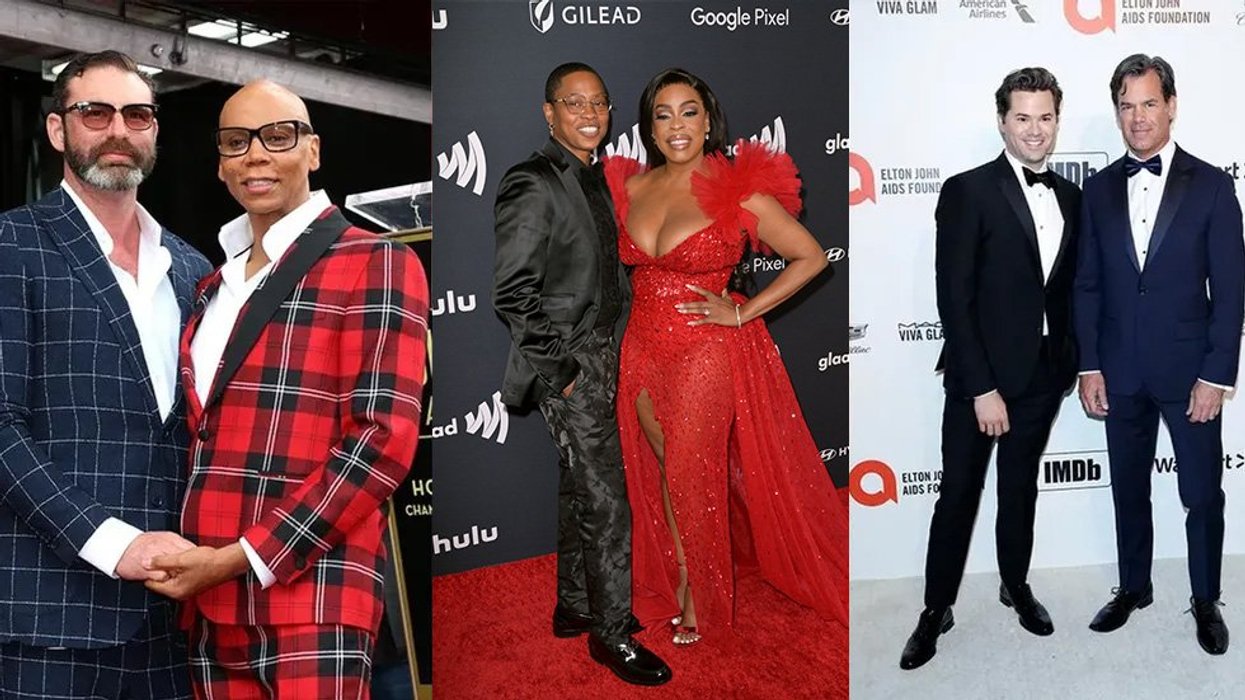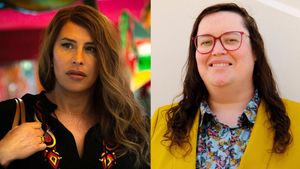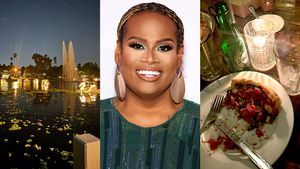Elder care, science, education, energy, sports… these aren’t LGBT issues, they’re people issues. These are some of the most challenging and heated areas of culture, and at the foreground are four very heroic LGBT women.
Advocate spotlights Marcy Adelman, Joan Roughgarden, Kristina Johnson and Sherri Murrell, four women making a mark on our world for the better. Four real live heroes shaping their industries and our futures.
Meet the women Advocate has named Innovators.

Marcy Adelman
64 • San Francisco
Elder Housing
Like a lot of her compatriots, Marcy Adelman moved to San Francisco in 1971 to live an openly lesbian life. “It was the epicenter of the gay rights movement,” she says. But as she went to political meetings or walked about the predominantly gay Castro neighborhood, she noticed a lack of older people. “I had grown up in an intergenerational family and couldn’t imagine a community that didn’t include seniors,” she says.
In 1973 she worked on the first National Institute of Mental Health study of lesbian and gay aging, and she later edited an anthology of life stories written by lesbian elders. Among them was an 85-year-old who was having trouble seeing, walking, and bathing. Since the woman had no family, Adelman and her friends stepped in to provide the care necessary to let her live independently in her own home until she died.
It didn’t take long for Adelman, who received her Ph.D. in clinical psychology, to realize that LGBT seniors were invisible to the city's mainstream service providers, so in 1998 she and her late partner, Jeanette Gurevitch, founded what would become Openhouse, a nonprofit, community-based organization seeking to ensure that the LGBT elderly have access to affordable housing and any assistance they may require, delivered in a culturally sensitive manner.
“Research shows that today’s LGBT seniors are twice as likely as heterosexuals to live alone, four times less likely to have children, and 10 times less likely to have a caregiver,” she says. Other particular challenges to older LGBT people, Adelman learned, include a dearth of health care programs and nursing homes that welcome them, plus their own reluctance to seek services out of fear of discrimination.
In partnership with the San Francisco Mayor’s Office of Housing, and aided by a $50,000 Social Innovator Prize, Openhouse is developing 109 units of affordable housing in the city. Slated to be completed by 2016, the complex will offer studio, one-, and two-bedroom apartments for LGBT seniors of all income levels, and it will provide both on-site services and a senior center.
Adelman is rightfully proud of her organization’s accomplishments. “Most importantly, LGBT seniors aren’t invisible anymore,” she says. “They now have a place to call that will refer them to the right LGBT-welcoming resources.”- Winston Gieseke
More on next page...
\\\
(continued)
Joan Roughgarden
65 • Kapaa, Hawaii
Science & Education
It takes a brave woman to question the theories of Charles Darwin, but evolutionary biologist Joan Roughgarden isn’t afraid. Spurred in part by the stunning diversity of people she saw at an LGBT Pride parade in the ’90s, Roughgarden has spent years debunking Darwin. Her audacious attack became the groundbreaking tome Evolution’s Rainbow: Diversity, Gender, and Sexuality in Nature and People, in which she argued that the variations in gender and sexuality found in many species suggests that Darwin was wrong about sexual selection and the gender binary.
“Darwin is beyond reproach in scientific circles,” says Roughgarden, a professor emerita at Stanford University. But it’s not possible to comprehend the diversity of sexuality without disowning him, she says, “because Darwin focused on sexuality solely in terms of fertilizations. Darwin’s emphasis on procreative mating rules out thinking of sexuality as serving social purposes. The social setting established through sexuality as well as other forms of physical and verbal intimacy lead to the production of offspring even if many particular acts do not directly produce offspring.”
Author of several critically acclaimed books, Roughgarden was often discounted because she’s transgender. “I did not expect the homophobic and disrespectful comments from professional biologists,” she admits.
The Harvard-trained Roughgarden, who taught at Stanford for nearly 40 years, didn’t come out as transgender until she was 52 years old. She says she was worried about the impact on her career, but “I was fully prepared to leave academia and wait on tables for a living if necessary. None other than Condoleezza Rice, then provost at Stanford, gave me permission to remain on the faculty.”
Does she think of herself as an innovator? “I don’t think about myself very much,” she admits, “except to say that I am determined to live my life as an idealist and to have faith that eventually, perhaps in another generation, the facts and ideas that I have placed on the table will be rationally engaged.”
While she and her husband (whom she wed last year) have retired and moved to Kapaa, Hawaii, the ideas of this 65-year-old scientific changemaker live on. “Today’s efforts to redefine sexual selection to sidestep all the contrary evidence against its original conceptualization may postpone the day of reckoning,” she says, “but that day will come nonetheless.” —Diane Anderson-Minshall
More on next page...
\\\
(continued)
Kristina Johnson
54 • Washington, D.C
Energy
It takes serious brains, a rainmaker’s résumé, and diehard passion to stand out among the luminaries at the Aspen Ideas Festival. Kristina M. Johnson, who left her post as undersecretary in the Department of Energy for the Obama administration in November, fits the description. Her excitement on trending green energy topics — biofuels or anaerobic composting, for instance — was palpable as she spoke to The Advocate upon returning from the annual event, which this summer drew the likes of former president Bill Clinton, New York Times columnist Thomas L. Friedman, and MIT economist and poverty expert Esther Duflo.
“If we can learn to communicate all of these positive advances, and learn from the best practices, our efforts are really going to be amplified,” Johnson says.
With the administration’s lofty goal of generating 80% of the country’s electricity through clean sources by 2035, private-sector innovation and funding are critical. And Johnson’s consulting firm, Enduring Energy, is helping to make that happen. Her primary focus is finding a way to significantly raise the nation’s hydroelectric output without building new dams.
Reflecting on her two-year political tenure, Johnson says she’s optimistic that Washington will be proactive on green issues for economic as well as environmental reasons. “Rational individuals elected to Congress will do the right thing, and what needs to be done is a cap on greenhouse emissions. The health care costs alone from a carbon-based economy are a third- to a half-trillion dollars each year,” she says, citing a study published in February by Paul Epstein, associate director of the Harvard Center for Health and the Global Environment, on coal power’s disastrous public health consequences.
A former provost at Johns Hopkins University who holds a Ph.D. in electrical engineering from Stanford University (as well as 45 patents), Johnson traces her green energy inspiration back to the inaugural Earth Day in 1970 — and an early eco-mentor.
“I had a great eighth-grade teacher who was really pro-environment and taught me a lot about recycling,” she recalls. “So I cleaned all the fields around our house. Pretty soon our entire basement was filled with aluminum cans.” —Andrew Harmon
More on next page...
\\\
(continued)
Sherri Murrell
43 • Portland, Ore.
Sports
Saying homophobia runs rampant among men in professional and college sports is like saying water is wet. What might actually be surprising to some is hearing that homophobia among female sports professionals is just as pervasive, at least according to Sherri Murrell, the head coach of the women's basketball team at Oregon’s Portland State University. Murrell is the only out NCAA Division I head basketball coach.
“Women’s sports has always been labeled as lesbian, and many try to combat that,” Murrell says. “Talking to some of my colleagues, it’s just one more factor they believe can keep them from being successful. But I’m the true story that it doesn’t have to be that way.”
Ever since Murrell arrived at PSU four years ago, she’s been straightforward about her wife (and now their 2-year-old twins) — and her career has skyrocketed. As a closeted woman, Murrell previously coached the women’s basketball team at Washington State University, but in five years she suffered through a 27-114 record. In 2007, Murrell resigned her position in Washington and, without a job, bought a house in her hometown of Portland. Serendipitously, the Portland State coach quit two months later and the Vikings’ athletic director called; he wanted to take a chance on Murrell.
Murrell says being out has made her a better coach, and the stats back that up. During her tenure, the Vikings have nabbed more overall and conference wins than they had in the five seasons prior. They now have a four-year record of 83-46. In the 2009-2010 season, Murrell brought the ladies to their first NCAA tournament, and this past season Murrell was named the Big Sky Conference Coach of the Year.
“I don’t have to preach integrity and say on the court, ‘Be true to yourself,’ and then shut the door and lie to them by concealing my life,” Murrell says. “I know the [gay] coaches who constantly think about the fact that they can’t bring their partner to an event or they can’t be in public with their partner. Well, I don’t have that — happy coach makes happy players.” —Neal Broverman
Read the complete list of all eight LGBT Innovators on Advocate.com now.




























































































































